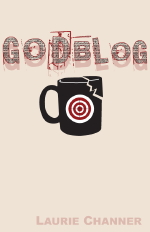 Godblog wasn’t a bad book, but there were some structural problems that kept it from being a really good one. Most of the first hundred pages could have been cut without damaging the plot, and it would have given the book a tighter, more focused feel. It would have also eliminated a number of tertiary characters who did almost nothing but take up space, and may have allowed some of the bigger supporting characters to fade into the background just the tiniest bit and actually be supporting characters, rather than constantly jockeying for the lead role. The jumping back and forth in the narrative, while not frequent, heightened the suspense in one sense, but killed it for any number of smaller, but more interesting, mysteries, and as the timelines began to converge and characters were discovering startling truths, Channer seemed to forget more than once that she had given a character the exact same revelation earlier in the novel.
Godblog wasn’t a bad book, but there were some structural problems that kept it from being a really good one. Most of the first hundred pages could have been cut without damaging the plot, and it would have given the book a tighter, more focused feel. It would have also eliminated a number of tertiary characters who did almost nothing but take up space, and may have allowed some of the bigger supporting characters to fade into the background just the tiniest bit and actually be supporting characters, rather than constantly jockeying for the lead role. The jumping back and forth in the narrative, while not frequent, heightened the suspense in one sense, but killed it for any number of smaller, but more interesting, mysteries, and as the timelines began to converge and characters were discovering startling truths, Channer seemed to forget more than once that she had given a character the exact same revelation earlier in the novel.
I’m also not a huge fan of the pseudo-chatty prose style (reminiscent of what I have called the “Canadian Indie Style” in the past, with shades Jim Munroe and of course Cory Doctorow, who is thanked in the acknowledgements); it always winds up feeling like a first draft, unfinished. And the ‘Heathen’ nickname got under my skin. It struck me as the sort of nickname someone who desperately wants to be cool would give themselves, and the fact that it caught on so readily with nearly all the other characters (despite the lady-protests-too-much reaction from Heather, the character it was applied to) makes me think the reader was supposed to think it was cool too, rather than what it was (obvious, clumsy, and so on-the-nose it hurts).
The premise, of the blog that takes on a life of its own, was interesting, and Channer got a lot of the little details right. But she also missed one of the cardinal rules of using that sort of device: if you’re going to include art/poetry/etc that’s meant to inspire, or be beautiful, or what have you, you need to either to be really goddamn good at pulling that sort of thing off yourself, or you need to hang a lampshade on it. The blog posts were occasionally clever, but usually too generic to be convincing, and there were no lampshades in sight.
Despite those problems, the characters were emotionally real, if a little melodramatic at times, and easy to care about. The things I mentioned above just made it impossible for me to get lost in it, and I wound up reading it with my ‘editor’ and ‘critic’ hats on, rather than just my ‘reader’ hat, which is how I prefer to read books I’m not actually being paid to write about.